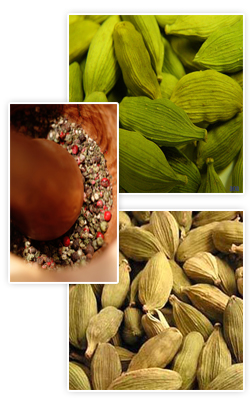
| GREEN CARDAMOM | Types of Spices are available for Export |
Cardamom is one of the world’s very ancient spices. It is native to the East originating in the forests of the western ghats in southern India, where it grows wild. Today it also grows in Sri Lanka, Guatemala, Indo China and Tanzania. The ancient Egyptians chewed cardamom seeds as a tooth cleaner; the Greeks and Romans used it as a perfume. Vikings came upon cardamom about one thousand years ago, in Constantinople, and introduced it into Scandinavia, where it remains popular to this day. Cardamom is an expensive spice, second only to saffron. It is often adulterated and there are many inferior substitutes from cardamom-related plants, such as Siam cardamom, Nepal cardamom, winged Java cardamom, and bastard cardamom. However, it is only Elettaria cardamomum which is the true cardamom. Indian cardamom is known in two main varieties: Malabar cardamom and Mysore cardamom. The Mysore variety contains higher levels of cineol and limonene and hence is more aromatic Spice Description Cardamom comes from the seeds of a ginger-like plant. The small, brown-black sticky seeds are contained in a pod in three double rows with about six seeds in each row. The pods are between 5-20 mm (1/4”-3/4”) long, the larger variety known as ‘black’, being brown and the smaller being green. White-bleached pods are also available. The pods are roughly triangular in cross section and oval or oblate. Their dried surface is rough and furrowed, the large ‘blacks’ having deep wrinkles. The texture of the pod is that of tough paper. Pods are available whole or split and the seeds are sold loose or ground. It is best to buy the whole pods as ground cardamom quickly loses flavour. Bouquet: Pungent, warm and aromatic. Flavour: Warm and eucalyptine with camphorous and lemony undertones. Black cardamom is blunter, the eucalyptus and camphor suggestions very pronounced. Diffrent Names in Diffrent Languages French: cardamome German: Kardamom Italian: cardamomo, cardamone Spanish: cardamomo Burmese: phalazee Chinese: ts’ao-k’ou Indian: chhoti elachi, e(e)lachie, ela(i)chi, illaichi Indonesian: kapulaga Thai: grawahn, kravan Quality Cargoes & Committed Shipments Quality Control We strongly believe in quality committed cargoes. To maintain our quality we only supply north-east premium quality cargoes, which are beautiful in color and size. Beside all of it, we make our cargoes well cleaned and well dried with guaranteed maximum 12% mositure level. Honouring Commitments Committed shipments and timely deliveries are the most important factors in volatile Cloves business. To maintain our shipment schedule we are extremely against speculation. We prefer selling whatever is available in our warehouse ready to deliver. Forward shipments are also committed while keeping the ready cargo in our warehouses. |
|
| Home Services Freight Arrangements Documents Arrangement Inspection Insuarance Flexible Payment |
Products Cables Cement Cotton Corn Maize Pipe Plywood Spices Steel Sugar Wheat Flour |
Quality Quality Management Quality Standard Quality Policy |
Tel: +92-213-508 3658 Tel: +92-213-508 3659 E-mail: Info@Hyitco.Com Copyright © 2018 HYITCO |
